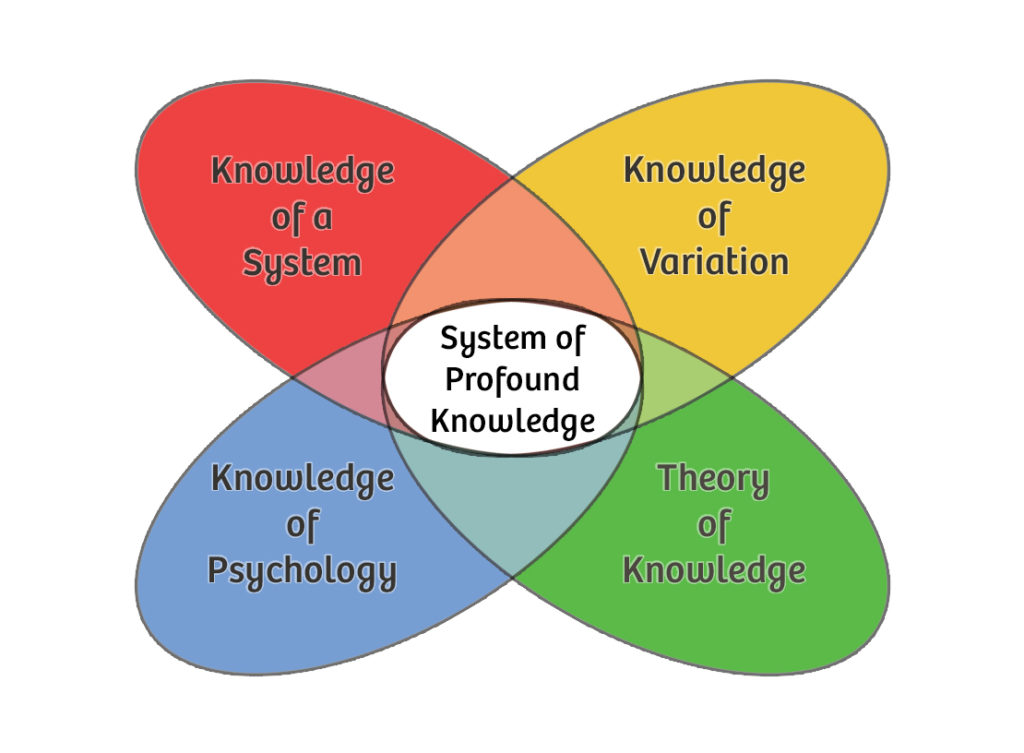What It Is:
System of Profound Knowledge is a management philosophy developed by W. Edwards Deming, a renowned statistician, professor, author, lecturer, and consultant. It serves as a framework for understanding the fundamental interconnections and dynamics within organizations. The System of Profound Knowledge consists of four interrelated components:
- Appreciation for a System:
- Recognizing the interconnectedness of components within an organization and understanding that they form a system. This involves viewing the organization as a whole and acknowledging the impact of decisions and actions on the entire system.
- Knowledge of Variation:
- Understanding the concept of variation in processes and outcomes. This involves recognizing common causes of variation (inherent to the system) and special causes (resulting from specific events or factors). Deming emphasized the importance of distinguishing between the two and making decisions based on an understanding of variation.
- Theory of Knowledge:
- Acknowledging that knowledge is provisional and evolving. Emphasizing the importance of continuously seeking and updating knowledge, understanding the limitations of one’s knowledge, and making decisions based on the best available evidence.
- Psychology:
- Understanding the role of human behavior and motivation within the system. Recognizing that individuals have intrinsic motivations and that management practices can significantly impact employee morale and performance. Encouraging a culture that values collaboration and continuous improvement.
How to Use It:
Using System of Profound Knowledge in Agile Coaching:
- Systems Thinking in Agile:
- Emphasize systems thinking in Agile practices. Help teams understand how their work fits into the larger organizational system. Consider the impact of decisions on the entire value stream rather than focusing solely on individual tasks.
- Variation and Agile Metrics:
- Apply the knowledge of variation to Agile metrics. Understand the natural variability in team performance and distinguish it from special causes. Use this understanding to improve processes rather than attributing variations solely to individual performance.
- Continuous Learning and Improvement:
- Promote a culture of continuous learning and improvement within the Agile team. Encourage retrospectives, where teams reflect on their processes, share knowledge, and identify opportunities for enhancement.
- Empathy and Team Dynamics:
- Consider the psychological aspect of Deming’s System of Profound Knowledge in team dynamics. Recognize and address the human factors that can influence team morale and collaboration. Foster a supportive environment that values individuals and their contributions.
Applying the System of Profound Knowledge in Agile coaching involves cultivating a deep understanding of the interconnectedness of organizational elements, embracing a mindset of continuous improvement, and valuing the human aspects of teamwork. It provides a holistic framework for guiding Agile teams toward effective and sustainable practices.
References:
- “Out of the Crisis” by W. Edwards Deming:
- Deming’s book “Out of the Crisis” is a key resource where he introduces the System of Profound Knowledge. It provides a comprehensive overview of his philosophy and principles.
- “The New Economics for Industry, Government, Education” by W. Edwards Deming:
- This book further explores Deming’s thinking, including the System of Profound Knowledge. It delves into the application of his principles in various organizational contexts.
- Deming Institute:
- The Deming Institute, founded by W. Edwards Deming, is a valuable resource for information on his teachings. The institute’s website provides articles, videos, and other materials related to the System of Profound Knowledge.
Visit the Agile Coach’s Toolkit for more definitions, models, theorems and stuff.

